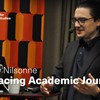merits
Fairness-based retributivism reconsidered
Criminal Law & Philosophy, pp. 1-18, Online först. Abstract In this paper, I defend fairness-based retributivism against two important objections, the no-benefit objection and the social injustice o
Marc Fleurbaey: Is social progress around the corner? Insights from IPSP
Marc Fleurbaey, Robert E. Kuenne Professor of Economics and Humanistic Studies, Princeton University and Professor of Public Affairs and the University Center for Human Values ABSTRACTThe International
Researcher & assistant to SEMI, a research project on integration of youth in Sweden
The Institute for Futures Studies (IFFS), Stockholm, is appointing one or two researchers (sociologist/social scientist), or one researcher and one assistant, to the project SEMI, for a one- or two-ye
Completed: Policy professionals in the welfare state
This project examines so called "policy professionals", people who are employed in order to affect policy and politics. What is the impact of them, rather than elected officials, gaining more influence over politics?
Richard Arneson: Should we reward the deserving? Some puzzles
Richard Arneson is a political philosopher with a special interest in theories of social justice. AbstractDo plausible fundamental principles of justice incorporate the idea of rewarding the deserving?

Wicked problem governance
By investigating the effects of the Covid-19 pandemic and climate change on the interaction between science, policy and the public, this project aims to solve how public governance can better deal with severe crises in the future.
Researchers wanted for a project on children's living conditions
The Institute for Futures Studies (IF), Stockholm, is appointing one or two researchers (sociologist/social scientist) to the projects: YOUNG: Children’s living conditions in a changing society: SocioeYOUNGWORK: Early labour market outcomes of young adults

Gustav Nilsonne: Pathways to an Open Science System. Replacing Academic Journals
Open science enables cumulative knowledge and facilitates discovery. The transition to an open science system is underway, but important roadblocks remain. A decentralised, evolvable network of platfo
The Reverse Gender Gap in Ethnic Discrimination: Employer Stereotypes of Men and Women with Arabic Names
International Migration Review, s. 1-28. DOI: 10.1111/imre.12170 Abstract We examine differences in the intensity of employer stereotypes of men and women with Arabic names in Sweden by testing how much
Gustav Nilsonne: Pathways to an open science system: Replacing academic journals
Venue: Institutet för framtidsstudier, Holländargatan 13, 4th floor, Stockholm, and onlineREGISTERResearch seminar with Gustav Nilsonne, Associate Professor of neuroscience. He is active in meta-sciencOpen science enables cumulative knowledge and facilitates discovery. The transition to an open science system is underway, but important roadblocks remain. A decentralised, evolvable network of platforms interconnected by open standards, and governed by the scientific community, is technically feasible. However, academic researchers remain tied to traditional journals not least because assessment of merit is tied to the venue of publication. Ways forward can include redirection of funding from legacy publishing models to new infrastructure and the development of new methods to assess scientific contributions. Concerted action by stakeholders needs to be combined with pluralistic experimentation on policies and interventions to further open science practices.








